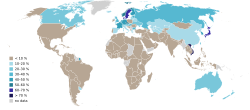
Agnostic atheism
Encyclopedia

Atheism
Atheism is, in a broad sense, the rejection of belief in the existence of deities. In a narrower sense, atheism is specifically the position that there are no deities...
and agnosticism
Agnosticism
Agnosticism is the view that the truth value of certain claims—especially claims about the existence or non-existence of any deity, but also other religious and metaphysical claims—is unknown or unknowable....
. Agnostic atheists are atheistic because they do not hold a belief
Belief
Belief is the psychological state in which an individual holds a proposition or premise to be true.-Belief, knowledge and epistemology:The terms belief and knowledge are used differently in philosophy....
in the existence of any deity and agnostic because they claim that the existence of a deity
Deity
A deity is a recognized preternatural or supernatural immortal being, who may be thought of as holy, divine, or sacred, held in high regard, and respected by believers....
is either unknowable in principle or currently unknown in fact. The agnostic atheist may be contrasted with the agnostic theist, who does believe that one or more deities exist but claims that the existence or nonexistence of such is unknown or cannot be known.
Examples
Bertrand RussellBertrand Russell
Bertrand Arthur William Russell, 3rd Earl Russell, OM, FRS was a British philosopher, logician, mathematician, historian, and social critic. At various points in his life he considered himself a liberal, a socialist, and a pacifist, but he also admitted that he had never been any of these things...
uses the example of the celestial teapot. He argues that although it is impossible to know that the teapot does not exist, most people would not believe in it. Therefore, one's view with respect to the teapot would be an agnostic "ateapotist", because while they don't believe in the existence of the teapot, they don't claim to know for certain.
Popular atheist author and biologist Richard Dawkins
Richard Dawkins
Clinton Richard Dawkins, FRS, FRSL , known as Richard Dawkins, is a British ethologist, evolutionary biologist and author...
articulates his own agnostic position in The God Delusion
The God Delusion
The God Delusion is a 2006 bestselling non-fiction book by British biologist Richard Dawkins, professorial fellow of New College, Oxford, and inaugural holder of the Charles Simonyi Chair for the Public Understanding of Science at the University of Oxford.In The God Delusion, Dawkins contends that...
: "I am agnostic only to the extent that I am agnostic about fairies at the bottom of the garden."
Some nontheists
Nontheism
Nontheism is a term that covers a range of both religious and nonreligious attitudes characterized by the absence of — or the rejection of — theism or any belief in a personal god or gods...
, such as fantasy
Fantasy literature
Fantasy literature is fantasy in written form. Historically speaking, literature has composed the majority of fantasy works. Since the 1950s however, a growing segment of the fantasy genre has taken the form of films, television programs, graphic novels, video games, music, painting, and other...
author Philip Pullman
Philip Pullman
Philip Pullman CBE, FRSL is an English writer from Norwich. He is the best-selling author of several books, most notably his trilogy of fantasy novels, His Dark Materials, and his fictionalised biography of Jesus, The Good Man Jesus and the Scoundrel Christ...
, identify with both the weakest definition of atheism (as lacking belief in a deity) and the weakest definition of agnosticism (as ignorance), "So I'm caught between the words 'atheistic' and 'agnostic'. I've got no evidence whatever for believing in a god. But I know that all the things I do know are very small compared with the things that I don't know".
History
One of the earliest definitions of agnostic atheism is that of Robert FlintRobert Flint
Robert Flint was a Scottish theologian and philosopher, who wrote also on sociology.He was born near Dumfries and educated, at the University of Glasgow. After a few years of pastoral service, first in Aberdeen and then at Kilconquhar, Fife, he was appointed professor of moral philosophy and...
, in his Croall Lecture of 1887–1888 (published in 1903 under the title Agnosticism).
The atheist may however be, and not unfrequently is, an agnostic. There is an agnostic atheism or atheistic agnosticism, and the combination of atheism with agnosticism which may be so named is not an uncommon one.
If a man has failed to find any good reason for believing that there is a God, it is perfectly natural and rational that he should not believe that there is a God; and if so, he is an atheist... if he goes farther, and, after an investigation into the nature and reach of human knowledge, ending in the conclusion that the existence of God is incapable of proof, cease to believe in it on the ground that he cannot know it to be true, he is an agnostic and also an atheist – an agnostic-atheist – an atheist because an agnostic... while, then, it is erroneous to identify agnosticism and atheism, it is equally erroneous so to separate them as if the one were exclusive of the other...
Further reading
- Howe, Frederic R. Challenge and Response. Grand Rapids: The Zondervan Corporation, 1982. ISBN 0-310-45070-5
- Martin, Michael. Theism. MSN Encarta, 2000. Microsoft Corporation.
- Martin, Michael. Atheism: A Philosophical Justification. Philadelphia: Temple UP, 1992. ISBN 0-87722-943-0
- Smith, George H. Atheism: The Case Against God. 1st ed. Amherst: Prometheus Books, 1980. ISBN 0-87975-124-X
- Stein, Gordon. The Encyclopedia of Unbelief. Amherst: Prometheus Books, 1985. ISBN 0-87975-307-2

